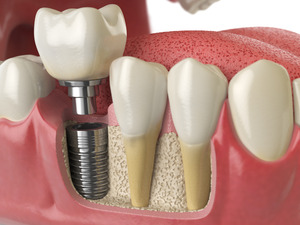Can My Dental Implants Stain Like Real Teeth?
August 13, 2024

Dental implants are a popular solution for missing teeth, offering a durable and natural-looking alternative to dentures or bridges. However, many wonder if implants can become stained or discolored like natural teeth. While implants have some resistance to staining, the materials and care involved play a crucial role in maintaining their appearance. Here’s how implants differ from natural teeth in staining potential and how to keep them looking pristine.
Staining Resistance of Implants
Dental implants are typically made from porcelain or ceramic materials, which are highly resistant to staining compared to natural tooth enamel. Unlike enamel, which is porous and can absorb pigments from foods, drinks, and tobacco, the surface of an implant is non-porous. This means that substances like coffee, tea, red wine, or smoking won’t stain the implant itself as easily as they would a natural tooth. However, implants aren’t entirely immune to discoloration.
Causes of Discoloration Around Implants
Although the implant crown might resist direct staining, the surrounding areas such as the gum line or adhesive materials used in bonding can still be susceptible to discoloration. Over time, plaque and tartar can build up around the implant, leading to a yellowish or brownish appearance, especially near the gum tissue. This is often due to improper oral hygiene, which can allow staining agents to stick to the plaque rather than the implant itself. Regular dental cleanings and meticulous home care are crucial in preventing this buildup.
Preventing Stains on Implants
While dental implants don’t stain as easily as natural teeth, it’s still essential to take preventive measures to keep them looking bright. Regular brushing and flossing are necessary to remove plaque and bacteria that can lead to discoloration. Using a soft-bristle toothbrush and non-abrasive toothpaste helps avoid scratching the surface of the implant, which could make it more prone to staining over time. Routine visits to the dentist for professional cleanings are also important, as they can address any early signs of plaque buildup or staining that might not be visible at home.
About the Author
Dr. Laura Philipps prides herself on offering more than you can expect from your typical dentist. Not only will she provide you with exceptional dental care, but she also makes sure to form personal relationships with her patients to ensure that her care is tailored specifically to you. Dr. Philipps received her Doctor of Dental Medicine at Tufts University and, in the interest of continuing her education, is a member of the American Academy for Oral Systemic Health. If you have any questions about dental implants, we can be reached at our website or by phone at (432) 570-4433.
No Comments
No comments yet.
RSS feed for comments on this post.
Sorry, the comment form is closed at this time.
